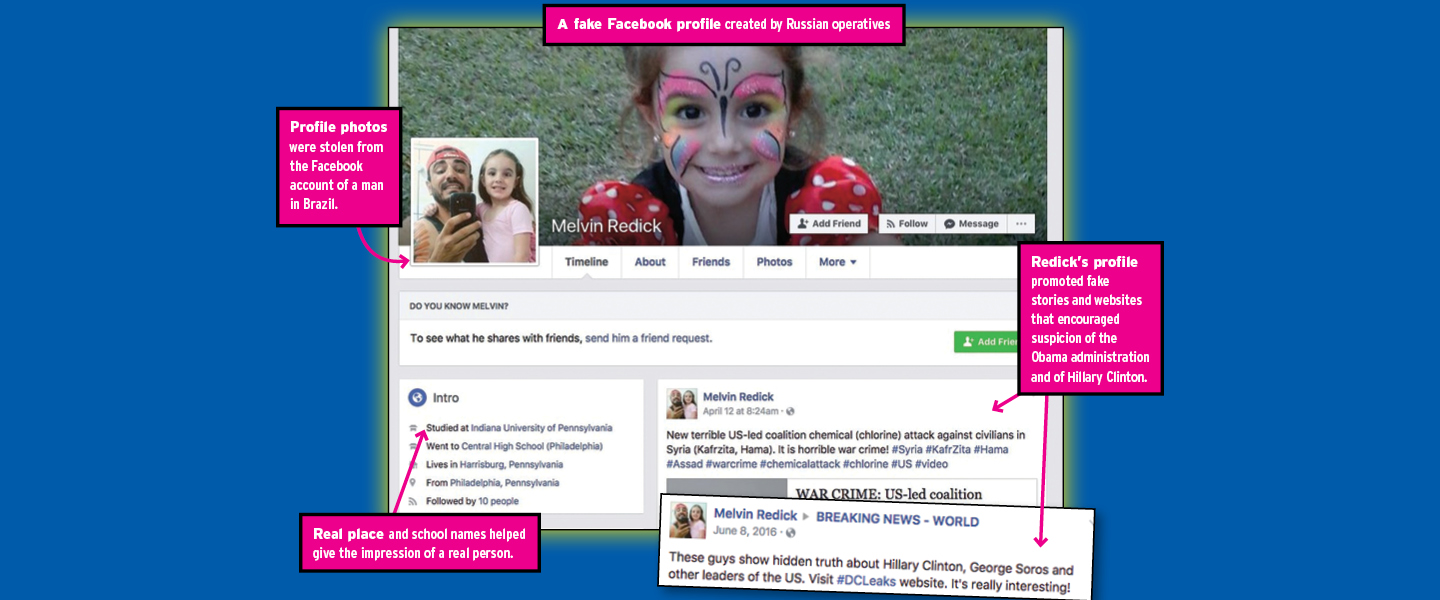The Facebook page of Melvin Redick looked innocent enough: His profile photo showed a friendly looking American wearing a backward baseball cap and posing with his young daughter. He said he lived in Harrisburg, Pennsylvania, and graduated from Central High School.
But Redick, it turns out, was the fictional creation of Russian hackers believed to be working for the government of President Vladimir Putin. The charming photos were, in fact, stolen from the Facebook account of a Brazilian dad (see graphic, above).
The purpose of this fake profile—and many others like it—was to encourage American outrage, fuel social conflict, and undermine the presidential campaign of Democrat Hillary Clinton. It’s now clear that Russia created hundreds of fake accounts on social media sites like Facebook and Twitter and bought ads on Google as part of a sophisticated campaign to influence the outcome of the 2016 presidential election.
Several U.S. government agencies have investigated the Russian operation, concluding “with high confidence” that Putin ordered it to help Donald Trump win the election. Special Counsel Robert Mueller, appointed by the U.S. Department of Justice, continues to look into whether President Trump or anyone in his campaign colluded with the Russian government in any way to improve his chances of victory—which Trump vehemently denies.
“It will take more time and length and breadth to know what Russia did on social media,” says Congressman Adam Schiff, a Democrat of California. “But the themes are consistent across platforms: the desire to help Donald Trump, to hurt Hillary Clinton, and the desire to set Americans against each other.”
Amid pressure from government investigators, tech companies are beginning to acknowledge the scope of Russia’s abuse of their platforms.
Melvin Redick’s Facebook page looked innocent. His profile photo showed a friendly looking American wearing a backward baseball cap and posing with his young daughter. He said he lived in Harrisburg, Pennsylvania, and graduated from Central High School.
But it turns out that Redick was the fictional creation of Russian hackers. Investigators believe these hackers were working for the government of President Vladimir Putin. In fact, the charming photos were stolen from the Facebook account of a Brazilian dad (see graphic, above).
The purpose of this fake profile—and many others like it—was to encourage American outrage, fuel social conflict, and undermine the presidential campaign of Democrat Hillary Clinton. It’s now clear that Russia created hundreds of fake accounts on social media sites and bought ads on Google as part of a sophisticated campaign to influence the outcome of the 2016 presidential election.
Several U.S. government agencies have investigated the Russian operation. They concluded “with high confidence” that Putin ordered it to help Donald Trump win the election. Special Counsel Robert Mueller, appointed by the U.S. Department of Justice, continues to look into whether President Trump or anyone in his campaign colluded with the Russian government in any way to improve his chances of victory. Trump vehemently denies any connections with Russia’s operation.
“It will take more time and length and breadth to know what Russia did on social media,” says Congressman Adam Schiff, a Democrat of California. “But the themes are consistent across platforms: the desire to help Donald Trump, to hurt Hillary Clinton, and the desire to set Americans against each other.”
Under pressure from government investigators, tech companies are beginning to acknowledge the scope of Russia’s abuse of their platforms.

